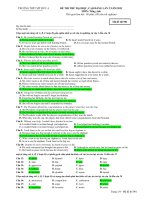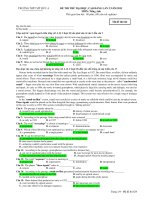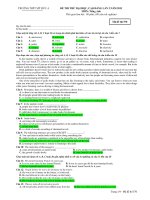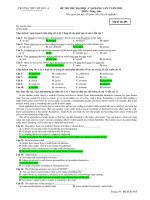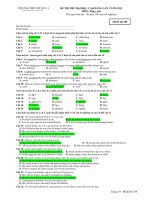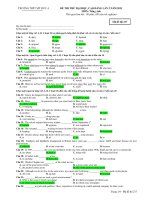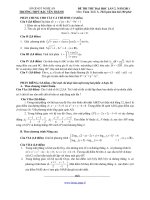Đề kiểm tra 1 tiết lần 2 năm 2017-2018 môn tiếng Anh lớp 12 - THPT Bắc Trà My - Mã đề 215
Bạn đang xem bản rút gọn của tài liệu. Xem và tải ngay bản đầy đủ của tài liệu tại đây (67.05 KB, 3 trang )
SỞ GD&ĐT QUẢNG NAM
TRƯỜNG THPT BẮC TRÀ MY
KIỂM TRA 1 TIẾT – LẦN 2 NĂM 2017-2018
MÔN: TIẾNG ANH - 12
Thời gian : 45 phút
Họ tên học sinh: . . . . . . . . . . . . . . . . . . . . . . .SBD: . . . . . . . . .Lớp: 12/ . . Mã đề : 215
Mark the letter A, B, C, or D on your answer sheet to indicate the sentence that is closest in
meaning to each of the following questions
Question 1: He cannot lend me the book now. He has not finished reading it yet.
A. As long as he cannot finish reading the book, he will lend it to me.
B. He cannot lend me the book until he has finished reading it.
C. Not having finished reading the book, he will lend it to me.
D. Having finished reading the book, he cannot lend it to me.
Question 2: He behaved in a very strange way. That surprised me a lot.
A. His behaviour was a very strange thing, that surprised me most.
B. I was almost not surprised by his strange behaviour.
C. What almost surprised me was the strange way he behaved.
D. He behaved very strangely, which surprised me very much.
Question 3: His academic record at high school was poor. He failed to apply to that prestigious
institution.
A. His academic record at high school was poor; as a result, he failed to apply to that prestigious
institution.
B. Failing to apply to that prestigious institution, his academic record at high school was poor
C. His academic record at high school was poor because he didn’t apply to that prestigious
institution
D. His academic record at high school was poor as a result of his failure to apply to that prestigious
institution.
Question 4: I think Alfred Nobel invented dynamite.
A. It is thought that Alfred Nobel invented dynamite.
B. Alfred Nobel was thought to invent dynamite by me.
C. Alfred Nobel was invented dynamite by me.
D. It is think that Alfred Nobel invented dynamite.
Question 5: John will have received the papers by tomorrow.
A. The papers will have received tomorrow by John.
B. The papers will have received John by tomorrow.
C. The papers will have been received John by tomorrow
D. The papers will have been received by tomorrow by John.
Mark the letter A, B, C, or D on your answer sheet to indicate the underlined part that needs
correction in each of the following questions
Question 6: There are two semesters in an academic year in schools in England.
Question 7:
Question 8:
A
B
C
D
Each term in a school year in England is separated by one-month break called half term.
A
B
C
D
Schooling is optional to all English children from the age of 6 to 15.
A
B
C
D
ad the following passage and mark the letter A, B, C, or D on your answer sheet to indicate
the correct answer to each of the questions 9 - 13.
"Where is the university?" is a question that many visitors to Cambridge ask, but no one can
give them a clear answer, for there is no wall to be found around the university. The university is the
city. You can find the classroom buildings, libraries, museums and offices of the university all over the
city. And most of its members are the students and teachers or professors of the thirty-one colleges.
Trang 1/3
Cambridge was already developing town long before the first students and teachers arrived 800 years
ago. It grew up by the river Granta, as the Cam was once called. A bridge was built over the river as
early as 875.
In the fourteen and fifteen centuries more and more land was used for college buildings. The
town grew much faster in the nineteen century after the opening of the railway in 1845. Cambridge
became a city in 1951 and now it has the population of over 100,000 many young students want to
study at Cambridge. Thousands of people from all over the world come to visit the university town. It
has become a famous place all round the world.
Question 9: Why do most visitors come to Cambridge?
A. To study in the colleges in Cambridge. B. To see university.
C. To use the libraries of the university. D. To find the classroom buildings.
Question 10: Around what time did the university begin to appear?
A. In the 9th century B. In the 8th century
C. In the 15th century D. In the 14th century
Question 11: Why did people name Cambridge the "city of Cambridge"?
A. Because there is a river named Granta. B. Because the river was very well - known
C. Because there is a bridge over the Cam. D. Because it was a developing town.
Question 12: From what we read, we know that Cambridge is now _______.
A. a city of growing populationB. a city without wall.
C. visited by international tourists. D. a city that may have a wall around it.
Question 13: After which year did the town really begin developing?
A. After 1945
B. After 800
C. After 1845
D. After 875
Mark the letter A, B, C, or D on your answer sheet to indicate the word whose underlined
part differs from the other three in pronunciation in each of the following questions
Question 14: A. interviewed
B. finished
C. performed
D. delivered
Question 15: A. goes
B. leaves
C. misses
D. potatoes
Mark the letter A, B, C, or D on your answer sheet to indicate the most suitable response to
complete each of the following exchanges.
Question 16: The academic year in Vietnam is over _______ the end _______ May.
A. on / in
B. for / on
C. from / in
D. at / of
Question 17: In the UK, _______ schools refer to government-funded schools which provide
education free of charge to pupils.
A. primary
B. state
C. secondary
D. independent
Question 18: Gold ______ in California in the 19th century.
A. was discover B. was discovered
C. they discoveredD. has been discovered
Question 19: The room is being ______ at the moment.
A. cleaning
B. was cleaned
C. clean
D. cleaned
Question 20: How long does the whole Secondary Education in Vietnam last? – _______ years.
A. five
B. three
C. four
D. seven
Question 21: "David is in prison for smoking drugs. " - "He ______ that it was against the law. "
A. tells
B. was told
C. told
D. is telling
Question 22: Mathematics, a required subject in all schools, is _______ into many branches.
A. grouped
B. prepared
C. divided
D. added
Question 23: A/an _______ is an official document stating that you have passed an examination,
completed a course, or .achieved some necessary qualifications.
A. certificate
B. test
C. education
D. requirement
Question 24: ______ that military spending is extremely high.
A. It is felt
B. It feels
C. We are left
Question 25: Beethoven's Fifth Symphony _______ next weekend.
A. is going to be performed
B. will have performed
Trang 2/3
D. We feel that it is
C. will be performing
D. has been performed
Question 26: The telephone _______ by Alexander Graham Bell.
A. is invented
B. invented
C. is inventing
D. was invented
Question 27: In England schooling is compulsory _______ all children from the age of 5 to 16.
A. with
B. over
C. for
D. to
Read the following passage and mark the letter A, B, C, or D on your answer sheet to
indicate the correct word or phrase that best fits each of the numbered blanks 28 - 32.
If women choose to pursue a career once they have children, they often miss out on a close
(28)______with their children. Helen Jamieson is a mother of three who has given (29)______ work to
look after her children full-time. She strongly believes that women are pressurized to do too much,
driving themselves to the absolute limit. In her own case, after six years of paid employment, Helen
finally decided to call it a day. She says she initially found it hard being at home, though she never
misses the job itself. She admits that if she had had a brilliant career to begin (30)______, she might
feel differently now. Financially, she is no worse off (31)______ before, as the cost of childcare and
commuting exceeded her actual income. (32)______the government starts to give other tax incentives
to working parents, she says she will not return to the workplace until her children are grown up.
Question 28: A. friendship B. relationship
C. scholarship
D. membership
Question 29: A. in
B. out
C. up
D. to
Question 30: A. at
B. with
C. up
D. to
Question 31: A. than
B. as
C. then
D. so
Question 32: A. Even if
B. If
C. Provided
D. Unless
Mark the letter A, B, C, or D on your answer sheet to indicate the word(s) CLOSEST in
meaning to the underlined word(s) in each of the following questions
Question 33: Catherine rejected many suitable men before settling on Tom.
A. accepted
B. saw
C. met
D. said no to
Question 34: He was dismissed because of his laziness.
A. sacked
B. appointed
C. offered
D. employed
Mark the letter A, B, C, or D on your answer sheet to indicate the correct answer to each of
the following questions
Question 35: Tom: “How did you get here?”
- John: …………………………
A. I came here by train
B. Is it far from here
C. The train was crowded
D. I came here last night
Question 36: Helen: “Where do you come from?”
Ann: ………………………..
A. Yes, I’ve just come here
B. I come from London
C. In London
D. I’m living in London
Mark the letter A, B, C, or D on your answer sheet to indicate the word that differs from the
other three in the position of primary stress in each of the following questions
Question 37: A. interview
B. company
C. formally
D. impression
Question 38: A. alcohol
B. comment
C. chemical
D. proceed
Mark the letter A, B, C, or D on your answer sheet to indicate the word(s) OPPOSITE in
meaning to the underlined word(s) in each of the following questions
Question 39: The US troops are using much moresophisticatedweapons in the Far East.
A. difficult to operate
B. expensive
C. complicated D. simple and easy to use
Question 40: The International Organizations are going to be in atemporaryway in the country.
A. guess
B. permanent
C. complicated
D. soak
--------------- THE END--------------
Trang 3/3

